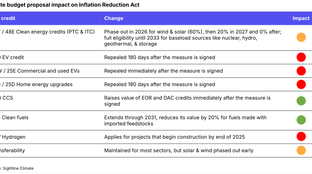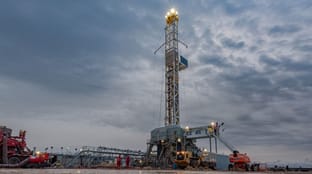
🌎 Overheard at LCAW #252
Climate, capital, and carrots in London's new playbook
Governance - not sustainability - sets listing tone
Happy Monday! In this week’s issue, we spotlight Tesla’s boot from the S&P500 ESG Index - tl;dr, ESG ain’t impact. No one is doubting Tesla’s impact track record, though the company’s poor corporate governance is real. Now Elon could use his unique communication ability and the ESG industry’s poor self-marketing to slander all of climate reporting as a scam.
In fundings, EV fleet management software takes in more than $200m, followed by a German provider of lease and purchase solar as well as a startup creating ‘air-core’ motors that reduce the weight of conventional heavy iron engines.
In the news, EU drafts their plan for weaning off RU natural gas which includes more renewables and shorter term reprieves on carbon caps (which put emissions reductions targets further back). Somewhat related, Germany and the Nordics endeavor to build a ‘green power plant’ for the EU using offshore wind capacity in the North Sea (by 2050). Not least, China launches the largest compressed air battery in the world to modulate electricity usage.
Thanks for reading!
— Elon Musk (@elonmusk) May 19, 2022
The S&P500 ESG Index gave Tesla the boot this week – initiating quality memes from Elon and general consternation from the environmental crowd. How could ESG indices “[rate Exxon] top ten best in the world for ESG by S&P 500, while Tesla didn't make the list!” goes the general argument, specifically quoted from Musk.
Because of one reason: ESG 👏 is 👏 not 👏 Impact. ESG qualifies corporate management, while Impact assessment measures (positive) externalities.
What happened? Tesla’s drop from the index was driven by poor working conditions at the Fremont facility, allegations of racial discrimination, and deaths and injuries linked to the “autopilot” feature. This caused expected blowback from the wide spectrum of Mike Pence to #EnergyTwitter along the lines of 1) Tesla has done the most for climate 2) ESG must be a scam.
What’s the background story? Tesla has long been the “perennial ESG paradox”. Of course the company has had undeniable, immense climate impact. But it doesn’t follow that ESG is a scam. The S&P methodology couldn’t be clearer that ESG does not care about Tesla’s climate impact. The scam is the public’s conflation of ESG with Impact.
Why does this matter? Everyone who knows better (ratings agencies, index providers, asset manager, and - yes - Elon) have happily been along for the joy ride as demand for “ESG” has skyrocketed. Turning a blind eye as the ESG myth has knowingly spiraled out of control has been lucrative. It’s easier for Elon to claim that the system is broken than to accept the justification of poor management allegations. And with his unopposed talent for controlling the narrative, he may turn public opinion against the system.
What comes next? ESG is financial risk assessment. Painting ESG with a scarlet letter would be a loss to risk analysis, and therefore to all who participate in financial markets. Additionally, the nascent Impact data and assessment industry (most relevant to high growth, early stage climate tech companies) may now be squashed because of smearing from the ESG industry’s poor communication. Look for more on climate VCs’ impact reporting from us soon.
🚗 Inspiration Mobility, a Washington, DC-based maker of EV fleet management software, raised $215m in funding from Macquarie Asset Management, Ferrovial, and ArcLight Capital Partners.
☀️ Zolar, a Germany-based startup providing homeowners with an easy way to buy or lease customized solar installations, raised $105m in Series C funding from Energy Impact Partners, GIC, Inven Capital, Heartcore Capital, Statkraft Ventures, and Pirate Impact Capital.
⚡ Infinitum Electric, a Round Rock, TX-based maker of "air-core" motors that generate the same power as "heavy iron" engines at a fraction of the weight, raised $80m in Series D funding from Riverstone Holdings, Alliance Resource Partners, Applied Ventures, Cottonwood Technology Fund, Chevron Technology Ventures, Aventurine Partners, Energy Innovation Capital, and Ajax Strategies.
🏙️ UrbanFootprint, a Berkeley, CA-based urban intelligence platform helping assess climate vulnerability and increase the resilience of critical infrastructure, raised $25m in Series B funding from Citi, Social Capital, 2150, A/O PropTech, Assured Guaranty, Dcode Capital, Valo Ventures, and Radicle Impact.
💨 Perennial (fka as Cloud Agronomics) a Boulder, CO-based startup building a soil carbon MRV platform for soil-based carbon removal, raised $18m in Series A funding from Temasek, Bloomberg, SineWave Ventures, and the Microsoft Climate Innovation Fund. [Disclosure: Sophie is an investor]
🌱 Sustain.Life, a New York, NY-based ESG-as-a-service software startup, raised $16m in Seed funding from Tapestry VC, Active Impact Investments, Kompas, Agya Ventures and Seyen Capital.
🔌 ChargeLab, a Canada-based software builder which operates and optimizes EV charging equipment, raised $15m in Series A funding from King River Capital, ABB E-Mobility, Construct Capital, Root Ventures, Highline Beta, Third Sphere, and Maple VC.
🌱 HowGood, a Brooklyn, NY-based sustainability data startup for consumer packaged goods and food products, raised $12.5m in funding from Titan Grove, FirstMark, and others.
🔋 Solithor, a Belgium-based developer of solid-state lithium battery cells, raised $10.5m in Seed funding from Imec.xpand, LRM, Nuhma and FPIM.
⚡ UtilityAPI, an Oakland, CA-based provider of data sharing software for electric utilities, raised $10m in Series A funding from Aligned Climate Capital.
☀️ Optivolt, a San Mateo, CA-based developer of solar tech for shady areas, raised $8.2m in Seed funding from Atlas Innovate, Impact Capital, Pure Ventures, and City Light Capital.
🚢 Seabound, a UK-based startup prototyping carbon capture equipment that connects to ships’ smokestacks to cut carbon emissions, raised $4.4m in Seed funding from Lowercarbon Capital, Eastern Pacific Shipping, Emles Venture Partners, Hawktail, Rebel Fund, and Soma Capital.
🌾 The Crop Project, a Brooklyn, NY-based developer of regenerative crops for food and beauty products, raised $1.5m in Seed funding from Norfolk Green Ventures, Susquehanna Foundation, and several strategic and impact investors.
Generation Investment Management, a London and SF-based investment firm, raised a $1.7B growth fund focused on planetary health, people health, and financial inclusion growth-stage companies.
Dragonfly Energy, a producer of lithium-ion batteries, announced a SPAC agreement with Chardan NexTech Acquisition 2, valuing the company at $500m.
Australia’s PM election results signaled a win for climate. Anthony Albanese beat out climate skeptic Scott Morrison and vowed to "end the climate wars”. While Australia ranks 15th in global emissions, it tops the list as the largest global exporter of coal.
The EU released its draft REpowerEU plan to wean itself off Russian natural gas. The plan addresses the energy transition from all three sides: demand (energy conservation); supply (diversifying away from Russian fossil fuels); and clean energy investment (accelerating renewables). On the third lever, four EU countries have pledged to build 150 GW of offshore wind in the North Sea to create a “green power plant”. But counterintuitively, the EU is looking to sell $21B of carbon permits making it easier to pollute in order to pay for the Russian gas exit.
In case of emergency, hit the code red climate button. The Climate Overshoot Commission, made up of former heads of state, leaders, and academics, will explore various adaptation responses if all else fails and we overshoot the Paris Agreement targets. One major topic at hand: large-scale carbon capture and geo-engineering to reflect sunlight back into space.
The DOE is putting more infra bill dollars to work, announcing a Notice of Intent to fund a $3.5B program to develop four direct air capture hubs – each capable of removing over a million tons of CO2 per year.
In more carbon capture news, BP and Linde join the fray of O&G majors (Exxon and Chevron) announcing plans for CCS projects along the Gulf Coast. The project, launching in 2026, would entail storing up to 15m metric tons of CO2 underground from Linde’s hydrogen production plants.
Big PE commitments for small software footprints. Vista Equity Partners, the $90B enterprise software PE firm, announced that all their portfolio companies have agreed to measure their GHG emissions, set annual reduction targets, and offset the remainder.
China is storing electricity “out of air”. One of the largest in the world, the 60 MW Jiangsu Jintan Salt Cave project is a soon-to-be commercially operational compressed air energy storage facility.
Hyundai is joining fellow automaker Rivian in Georgia, announcing a $6.5B EV and battery manufacturing facility set to launch in 2025.
Partners at 35+ climate venture firms send a letter to the Biden administration and Democratic congressional leaders urging the passage of clean energy legislation.
A new study from First Street Foundation provides every home in America with a wildfire threat score.
A new report from the Climate Safe Lending Network quantifies the CO2 emissions of large tech companies’ cash holdings.
TechCrunch reveals the early-stage startups presenting at the TC Sessions: Climate 2022 event on June 14 at UC Berkeley, including ChargeNet Stations and Algeon Materials.
Our friend Aravind at TerraWatch Space maps the market for earth observation climate tech.
Understand heat pump technology using McDonald’s packaging.
Want to get back from the bar in zero-carbon comfort? Uber is adding a "comfort electric" option to their ride hailing app.
The nurdle hurdle. Nurdles - tiny plastic beads - threaten marine ecosystems and human health.
Shayle Kann and Saloni Multani discuss how the current market downturn may affect climate tech.
California may be double counting methane reduction from dairy farms to support its Low Carbon Fuel Standard program.
Your new guilt-free sweet treat. Ben & Jerry’s is launching “Project Mootopia” to cut emissions in half on 15 dairy farms by 2024.
Where climate tech research funding is going.
🗓️ Carbon Accounting Standardization: Join on May 31st to learn from experts on how standardized reporting frameworks enable apples-to-apples emissions comparisons across companies, and hear how your organization can prepare for these standardized frameworks.
🗓️ Industrial Climate Tech Summit: Join on June 1st to hear from investors, policymakers, corporations, incubators, and entrepreneurs who are developing innovative solutions for the industrial sectors.
💡 Reuse, Recycle, Revamp: Apply for the second challenge round of the 2022 Hackaday Prize by June 12th to develop a new way of recycling materials that would otherwise end up in the waste stream.
**Managing Editor @Climate Tech VC
Account Executive @Waterplan
Head of Investor Relations @G2VP
Accelerator Program Manager @The Clean Fight NY
Associate in Climate @Deep Science Ventures
Climate Associate @Second Muse
Program Manager @Additional Ventures
Senior Cloud Data Engineer @Aigen
Associate @Arctern Ventures

Climate, capital, and carrots in London's new playbook

US plays popcorn politics with biofuels and beyond

Groundbreaking results from the geothermal developer’s main project